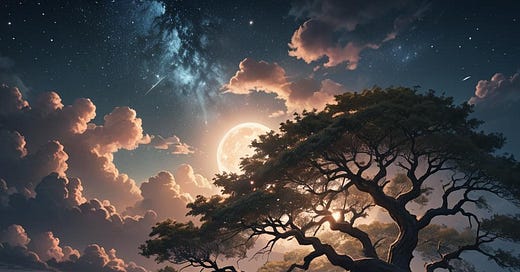NOTE: Because this November-December series (“A Call for a New Reformation”) is incredibly important to me, I’ve decided to open it up for free through the end of December 2024. If you find this series to be inspirational, empowering, or otherwise valuable and look forward to more, please consider supporting the “Religious, Reasonable, & Radical Newsletter & Community” (learn more) by becoming a paid member for a small monthly fee.
It's time for a confession: I am not a fan of going into nature for an extended period of time. Camping is not something I look forward to.
Mosquitoes. Snakes. Bears. Sharks.
Uncomfortable bumpy ground. The sounds outside of a tent while trying to fall asleep. A super-bright sun warming up my tent and making it difficult for me to sleep in.
I know, most people love camping. And I get it. In my mind, there's a certain allure. But practically speaking, it's not for me. I'm much happier in my cozy bed surrounded by my technology.
But, that doesn't mean that I don't have respect for nature. It doesn't mean I don't feel some responsibility for how we treat our Earth, which includes the various animal populations on it.
For the most part, I think I do. Could I be better at it? Definitely. Like everybody else, I am a perpetual work in progress.
In the beginning of Genesis, human beings are portrayed as stewards of the Earth. Despite how many Christians misinterpret this, being stewards of the earth does not mean that we should feel free to subjugate nature to our whims. We are not meant to use and abuse it as a resource.
Rather, stewardship is a caretaking role. As nature grants us the space and sustenance we need to enjoy life and flourish, we are meant to nurture that which has nurtured us so that it, too, might enjoy life and flourish.
While ancient people seem to have recognized the importance of respecting nature, we modern folk have lost that perspective.
The obvious truth we’ve forgotten is this…
We live in a symbiotic relationship with nature. If we do not care for it, we will ultimately die along with it.
Postmodern culture is experiencing a meaning crisis.
Why have we lost sight of Meaning?
Is there any hope of getting it back?
Better yet, is the loss of Meaning really a bad thing?
If you long for a theological path forward, Drinking from an Empty Glass: Living Out of a Meaningless Spirituality is the book you’re looking for.
Keep reading with a 7-day free trial
Subscribe to Religious, Reasonable, & Radical to keep reading this post and get 7 days of free access to the full post archives.




